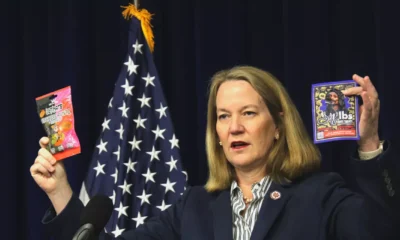Business
Heart Attack at 28: A Wake-Up Call for Arizona’s Medical Future

Just three years ago, Tatum Cushing, a Scottsdale resident, faced a life-altering heart attack at the age of 28. Her experience has unveiled harsh truths about health risks among individuals who often seem fine. Now, Arizona legislators have an important opportunity to enhance preventive health measures.
Cushing recalls that fateful day vividly. She was actively pursuing her dream—managing a salon and connecting with clients in Arizona and Texas. Suddenly, a blood clot obstructed her left coronary artery, leading to an urgent stent placement. It was during this ordeal that she discovered she had a genetic condition, lipoprotein(a) or Lp(a), which elevates the risk of heart attack and stroke.
In the years since, Cushing has become educated about genetically targeted technologies (GTTs). These advanced medical treatments aim to fix genetic maladies at their source by using non-replicating nucleic acids to modify RNA. Although GTTs are still under development, they hold the promise of transforming treatment options for genetic issues.
Before her diagnosis, Cushing had never considered genetic factors as a potential health threat. Current research into GTTs specifically targeting Lp(a) brings her optimism. However, Lp(a) remains absent from standard health screenings, leaving many Arizonans unaware of their risks. There is a critical need for improved screening and ongoing investment in innovative healthcare solutions.
Arizona has a chance to take meaningful action by supporting the MINI Act in Congress. This bipartisan legislation aims to give GTTs a better opportunity to reach patients by ensuring that innovators have sufficient time for development. This time is crucial for the discovery and testing of potentially life-saving therapies.
GTTs mark a paradigm shift in medical care. Rather than merely alleviating symptoms, they target the root causes of diseases. For individuals with hereditary conditions, this advances a long-awaited revolution in healthcare.
Many families in Arizona could benefit significantly. Heart disease, already the leading cause of death in the state, is often linked to genetic issues that frequently go undiagnosed. By raising awareness and providing better access to these innovations, Arizona could help citizens identify health risks earlier and lead healthier lives.
Supporting the MINI Act would enable this transformation by translating scientific advancements into practical healthcare solutions. This legislation delivers hope to those grappling with rare or complex health conditions, allowing quicker access to appropriate treatments.
Cushing shares her story with every client in her salon to encourage women to understand their health risks and advocate for themselves. She urges Arizona lawmakers to do the same and support a more intelligent approach to healthcare.
For progress in medicine, leadership that acknowledges the future is essential. The MINI Act is a crucial step in that direction.
Tatum Cushing is a dedicated patient advocate from Scottsdale, AZ.


















